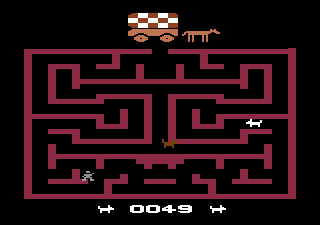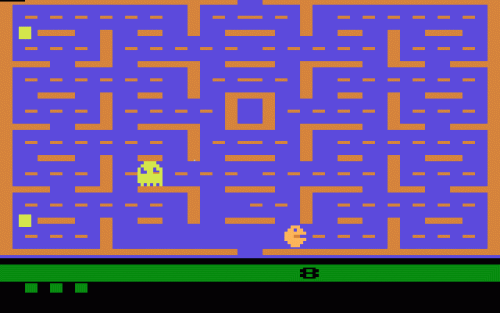
First and only entry in the "dog food maze game" genre
But gaming consoles weren’t the only area in which there was too much of a good thing. Atari’s VCS was a huge seller, with almost 10 million units in homes by 1982. The large potential for buyers led many companies to begin developing games for the VCS. There was no licensing system for Atari, as there would be for Nintendo and most subsequent consoles, so anyone with the resources available could manufacture VCS cartridges. Everyone and their brother developed games, most of them of dubious quality, and they clogged up retail shelves. Several games were obvious promotional tie-ins, like the Kool-Aid Man game, or Chase the Chuck Wagon, based on an ad campaign for dog food. (Yes, a game based on a commerical for dog food.) While there were some genuinely great Atari games, the vast majority were questionable rush jobs, undermining consumer confidence in the brand as a whole.
It wasn’t just the third-party manufacturers who released bad games, however. In late 1981, Atari released the VCS port of Pac-Man, programmed on a short schedule to make the important holiday season. Confident that the pellet muncher’s arcade success would translate to big sales, Atari printed 12 million copies, more than the number of VCS systems that had been sold at the time. The port was a poor one, with horrible flickering, repetitive sound, and a barely recognizable protagonist. Pac-Man showed players how obsolete the aging VCS hardware was.
The following year, Atari bet big by paying a tremendous sum for the license to Steven Spielberg’s masterful film, ET the Extra Terrestrial. With a mere six week window for programming, start to finish, the game ended up a mediocre mess. It’s frequently mentioned on “worst video game of all time” lists. Not even an adorable alien could save sales, and most of the ET cartridges were returned to Atari unsold.

I know Pac-Man, and you, sir, are no Pac-Man.
All of these factors were reasons why the bottom dropped out of the video game industry in 1983. Just a few short years earlier, all was well, and profits were skyrocketing. But now, Atari was bleeding money, thousands of dollars a day at one point. Video games were seen as a passing fad, and fire sales where cartridges sold for $1 were not uncommon. Home computer sales remained steady, but the industry was largely dead until the Nintendo Entertainment System came along in late 1985.
So what does the video game crash of 1983 have to do with the rise and fall of the music game? In many ways, the same factors that played a role in Atari’s fall were also significant in the death of the music game. While the decline of Guitar Hero and Rock Band aren’t nearly as devastating as the crash of 1983 was, we can trace similar patterns in both cases. In each cycle, too many releases, poor quality, and major misfires had a negative effect.